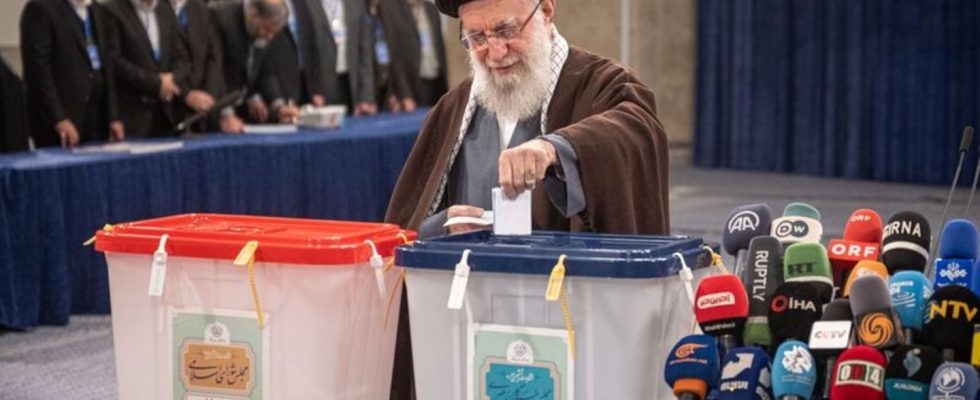Islamic Republic
Conservative power struggle: elections in Iran
Iran’s religious leader Ayatollah Khamenei during his vote in Tehran. photo
© Arne Bänsch/dpa
While critical candidates are largely excluded from the elections, many people in Iran do not want to vote this time. Many experts are more interested in something else than the result.
In the capital Tehran there has been little electoral mood in recent weeks. Many people are disillusioned after failed reform attempts in recent decades and plan to stay away from the vote. The camp of reform politicians is extremely weakened. As a result, conservative forces in particular are fighting for power. These are the first elections after the women-led protests in autumn 2022. Well-known activists, including the imprisoned Nobel Peace Prize winner Narges Mohammadi, called for a boycott.
Around 61 million voters in the Islamic Republic are called upon to elect not only the parliament (Majles) but also the so-called Council of Experts, an influential body of Islamic scholars. The first results are expected this weekend.
Political system between theocracy and republic
The political system of the Islamic Republic has combined theocratic and republican elements since the 1979 revolution. The 290 seats in parliament, five of which are reserved for religious minorities, are elected by the people every four years. The so-called Guardian Council, an ultra-conservative control body, decides on the ideological suitability of politicians. As a result, citizens can usually only choose from a group of candidates who are loyal to the system. For example, the Guardian Council excluded 5,000 applicants. Nevertheless, a record number of 15,000 Iranians are running.
Candidates do not enter the race with parties, but rather organize themselves through lists. In Tehran, for example, 30 seats are being elected for the National Assembly, and the alliances are each presenting 30 candidates. In the capital, half a dozen conservative groups are vying for dominance. A few days before the election, there were signs of a bitter power struggle between the incumbent parliament speaker Mohammed Bagher Ghalibaf and ultra-conservative camps. The current legislative period ends on May 26th.
The head of state is unlikely to be indifferent to the elections, as recent statements from top politicians and religious leader Ayatollah Ali Khamenei attest. They urged the nation to take part in the voting. In the last parliamentary election in 2020, voter turnout was officially just over 40 percent, the lowest in the history of the Islamic Republic. Many people in Iran are therefore interested in how low the voter turnout will be this time.
Election of the expert council becomes the center of attention
In addition to the parliament, the Council of Experts is also directly elected by the people. The body, which is elected for eight years, includes 88 Shiite clergy who determine the successor to the religious leader in the event of his death. Khamenei is considered the most powerful man in Iran; the head of state will be 85 years old in April. Only 144 candidates are eligible for the council. The low number was justified by strict theological requirements. Before the elections, the disqualification of moderate former President Hassan Ruhani, who has been a member of the Council of Experts for more than 20 years, caused criticism.
The Parliament is Iran’s legislative institution. The real power, however, is concentrated in the state leadership with religious leader Khamenei at the top. The president is also elected by the people as head of government every four years and appoints the ministers. The Security Council also has extensive powers. Iran’s elite military force, the Revolutionary Guards (IRGC), has expanded its influence at all levels in recent decades and has become an economic empire.

